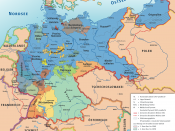It is widely believed that the rise of the Nazi party in 1933 was due in no small part to the failure of and public resentment towards the Weimar republic. The Nazi party were seen as a solution to a greatly flawed political system. The reason for such little faith in the system has been put down to many things, mainly weaknesses within the Republic itself, like it's troubled birth and weak image or parties inability to co-operate within it. But there are also external factors to take into account, broader trends in German history for instance it's legacy of powerful authoritarian leaders like Otto Bismarck or world wide situations like the economic depression that played a major role in the Republics downfall.
It is believed that the Weimar Republic's downfall was largely down to it's own weaknesses and mistakes it brought down on itself.
From the very beginning The Weimar Republic had an image problem.
The whole idea of a parliamentary democracy was suggested by General Ludendorff, the Germans were losing the war and needed to make peace and Ludendorff hoped that this new civilian Government would be able to come to better terms of peace with the Allies. Ludendorff also had a second motive for this proposition, as far as the German public were concerned their country was winning the war and its loss would have a deep moral impact, the German public who were proud of their powerful army. Ludendorff hoped that, as Weimar Republic would be the ones to make the peace proposition it would be they who were blamed for Germany's loss, covering up the actual responsibility of Generals like Ludendorff. This idea worked and the 'stabbed in the back' myth came about, the idea that the formidable German army had been betrayed by weak...



Good
good information, but the conclusion lacks
0 out of 0 people found this comment useful.